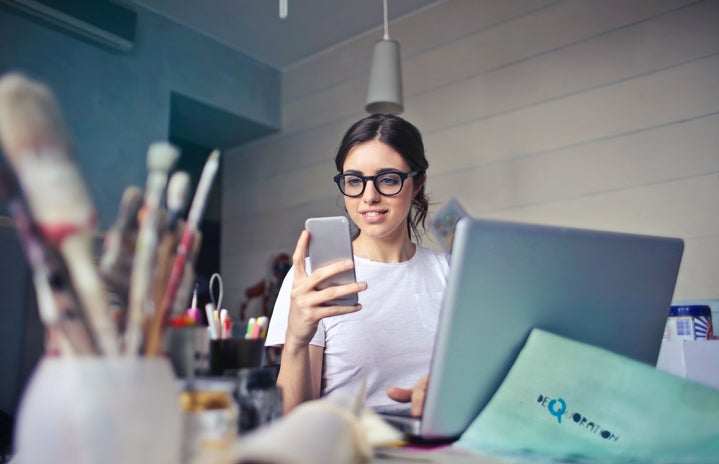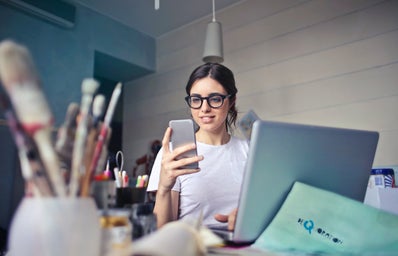We’ve all seen them on Instagram or advertised on our Facebook feed. They’ve been talked about on the news—often praised for being the hippest-necessity for virtual learning or meetings—but are blue light blocking glasses actually worth the hype? Or are these trendy accessories actually causing more harm than good for our vision?
My journey with blue light glasses started when my roommate ordered a pair off of Amazon. They were cute AF, relatively inexpensive and even her chiropractor told her that it was imperative that all online students should order a pair to spare our tired, young eyes. I’m not sure why we trusted a chiropractor’s medical opinion on eyewear so much, but you know, it seemed legit enough. So, after about a week of me stealing her glasses to take selfies and look extra cute and smart on Zoom, I decided to finally purchase my own pair.
I ordered the TIJN blue light blocking glasses on Amazon Prime and was super stoked to find that they arrived on my doorstep the next morning. They were really affordable; less than $20 for a pair and they even came with a little case and a microfiber lens rag. Immediately, I started to wear them all the time, and I could definitely tell the difference between when I had them on and when I didn’t. The lens on them has a slight yellow tint so that when you look at your screen it makes it appear as if it’s on night shift mode. *Cough cough*.

I became obsessed; they were just way too cute to take off and I loved feeling like a little academia queen. Unfortunately, after wearing them for about two days straight whenever I went onto my phone, laptop, or even watching TV, I realized that I had started to get really bad headaches, and my eyes just felt strange. I knew it had to be correlated with the glasses because when I took them off, the weird feeling in my eyes and head would subside, so I stopped wearing them for a little while. I assumed it was just my eyes adjusting to the ~benefits~ that these glasses provided.
Later that week I had to drive home for my yearly physical, where I was met with the dreaded eye exam. I’m not sure why the eye exam always sends shivers down my spine, seeing as I’ve always had more than perfect eyesight, but this time I was especially nervous. As I stood 20 feet away from the poster on the wall and covered one eye, I realized that I definitely couldn’t read the itsy bitsy line (that I used to do quite well on), but I couldn’t even make out the line above that I used to ace every time without a single miss. This could definitely be due to the natural effects of aging, but when I was driving back to school I realized that I was having difficulties reading the license plate on the car in front of me. This is where I got really concerned. And what do I do when I’m super concerned about a probably pretty serious medical issue? I Google it.
After doing some research, I was let down to find that in most medical journals, blue light glasses were debunked and seen as irrelevant in any effort to help reduce strain on the eyes from excessive screen time. I found that UV light is really the most harmful to our eyes, so the blue light from our screens isn’t doing the most direct damage. Blue light mostly affects our circadian rhythm, which can put a damper on our sleep quality. To combat this, simply turn on the night shift if you use Apple products, or change your screen display to the slightly orange-tinted mode to minimize the effects of blue light on sleep. This basically gives the same effect as blue light blocking glasses.
As for the legitimate safety of the glasses, chances are they won’t mess up your vision too bad, but these glasses are not FDA approved seeing as they don’t fall under the category of a medical device. The American Academy of Ophthalmology even directly states that “There is no evidence that the kind or amount of light coming from computer screens is damaging to the eyes” and that “The Academy does not recommend any special eyewear for computer use”.
Through my research, I came to the conclusion that the best preventative techniques we can practice to help our eyes from screen-use strain are to focus more on limiting screen time, keeping a safe distance from the screen when possible, keeping eye drops nearby if your eyes start to dry, and to even add a mattifying filter onto your screen to help minimize screen glare.

All in all, blue light blocking glasses are probably not going to help with any type of “irreversible eye damage,” seeing as they don’t protect against the real harms that our eyes are faced with. Although my heart is broken (because they’re just so cute), I will probably discontinue the use of my glasses seeing as they aren’t FDA approved and even give me headaches from time to time. If you’re interested in buying a pair, simply do your research and talk to your doctor before wearing them to make sure blue light blocking glasses are a good fit for you!



